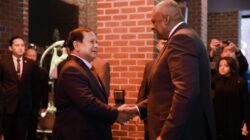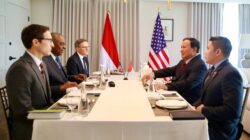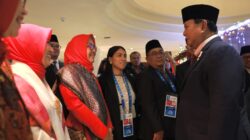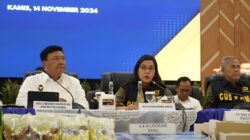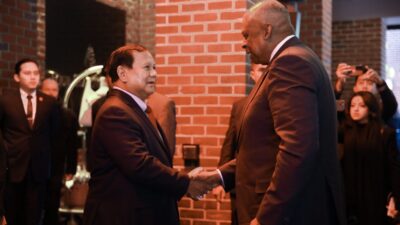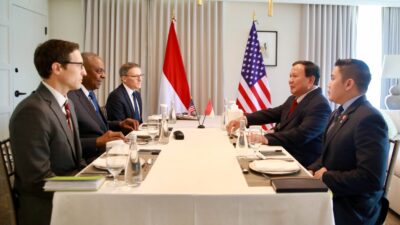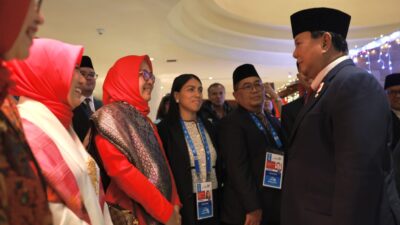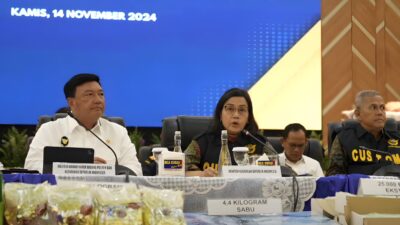By: Prabowo Subianto [excerpted from the book “Nation’s Transformation Strategy: Toward a Golden Indonesia 2045”, pages 108-119, 4th softcover edition]
If you’ve ever studied economics, you’re likely aware that there are numerous economic schools of thought in the world. There’s the neoclassical, free market, and neoliberal economic schools, often grouped under the Adam Smith school of economics. Then, there’s the socialist school, or the Karl Marx economic school.
Throughout history, some have argued, “Indonesia must choose A.” Others have suggested, “we should adopt B.” This debate continues to this day.
In my opinion, why choose? We should take the best from capitalism and the best from socialism.
This combination, as termed by Sukarno, Hatta, Sjahrir, and my father, Prof. Sumitro, is known as the people’s economy, or Pancasila economy, as written in the 1945 Constitution, particularly Article 33. We might also simply call it ‘Pancasila economy’.
The Relevance of Pancasila Economy
I want to stir now the thought that post-1998, we, as a nation, have lost our way. After 1998, we abandoned our identity. We left behind Article 33 of the 1945 Constitution, we forgot the Pancasila economy.
This has been my struggle over the years. To awaken, to revive awareness, to remind of Sukarno’s teachings: to stand on our own two feet.
This is fundamental and often forgotten. We embraced globalization, believing in a borderless world.
Yet, try going to America. You can’t enter without a visa. Sometimes Indonesians are denied visas. So, borders exist. Recently, many sought to reach Australia by sea, yet were blocked by Australian naval forces. Thus, despite extensive trade, borders remain. Therefore, we must be self-reliant.
Remember, nationalism isn’t negative. Nationalism is loving your own nation. If we don’t love our nation, who will? Should we seek pity from others?
Nationalism isn’t disgraceful. Every nation defends its national interests. Why shouldn’t Indonesia defend ours? Why shouldn’t our farmers receive state support?
For instance, in agriculture, American, Australian, Vietnamese, and Thai farmers are supported by their governments.
If we say, “we want to protect our national interests,” sometimes we’re accused of being anti-foreign. No. We shouldn’t be anti-foreign. The world is becoming more interconnected, and Indonesia is traditionally open. We are friendly, but we must be strong and independent.
A country’s self-reliance and capability to produce various goods domestically can now be measured by an index known as the index of economic complexity.
It was Professor Ricardo Hausmann of Harvard University, a former Minister of Planning in Venezuela, who discovered a strong correlation between a country’s prosperity and its self-reliance and capability to produce a diverse range of goods domestically.
This means the IMF’s 1998 prescription, which devastated many of our industries, was profoundly mistaken and should be abandoned. We must start manufacturing domestically whatever we can. We need our shipbuilding, automotive, food, textile, arms, and essential goods industries, as well as those processing intermediate goods. This will enhance our economic complexity and strengthen the Rupiah.
Pure socialism, although appealing on paper, is unworkable. In pure socialism, the principle of equal shares for all is impossible to implement. If enacted, people would lose the incentive to work hard.
In pure socialism, hard workers and slackers earn the same. The intelligent and the not-so-intelligent have equal salaries. Those willing to learn and those unwilling receive the same pay.
Even in a socialist utopia, eventually, money would cease to exist. How could this be? It’s utopian. A dream. Hard to implement, and countries that tried to adopt pure socialism have failed.
This means our forefathers, Sukarno, Hatta, Sjahrir, were correct. A mixed economy is the right path.
My father would always tell me at the dinner table. Sumitro’s term was mixed economy, combining the best of capitalism and socialism.
If we study Indonesian history, there was once a decision to adopt the Pancasila economic system. Our economy should be based on familial principles. Essentially, the strong may proceed, but the weak must be assisted. This would lead to equilibrium, a balance.
It’s incorrect to base an economy on “the survival of the fittest.” The pure capitalist notion that greed is good results in the demise of the weak.
In pure capitalism, only 1%, or even 1% of that 1%, of the population, a few families, would truly prosper.
This is currently happening in Indonesia and also in the West. Many in the West have questioned the belief in the trickle-down effect. In reality, the trickle-up effect occurs: the rich get richer while the poor get poorer.
We should pursue a middle path economic school, a mixed economy, or as former UK Prime Minister Tony Blair said, “the third way”. Or, reverting to Sukarno and Hatta’s term, “people’s economy”.
In Vietnam today, it’s common to see murals stating “economy for the people, not people for the economy”. Our orientation should be similar.
If we’re mistaken now, we must have the courage to change course. We must return to the blueprint laid out by our Founding Fathers, the 1945 Constitution.
I say this because Article 33 of the original 1945 Constitution clearly states: Our economy does not follow the free market school but is based on familial principles.
Furthermore, Article 33 clearly states that all “important production branches must be controlled by the state”. “Controlling the essentials of life” must be in the state’s hands.
Moreover, “the land, water, and the natural resources contained therein are controlled by the state and used for the greatest prosperity of the people”.
This is our economic blueprint. This is the system we should be running – the Pancasila economy. If we consistently implement it, like China does with their constitution, we can stop the current outflow of our natural and national wealth.
As previously mentioned, our economy should be a middle ground, a mixed economy, a Pancasila economy. We shouldn’t fully embrace capitalism or socialism.
We must adopt the best aspects of capitalism. Capitalism fosters innovation, entrepreneurship, and investment.
However, capitalism needs to be balanced with safeguards for the broader population. Pure capitalism, which relinquishes everything to the market, results in what we’re currently experiencing. In a free-market economy, there’s no protection, no hope for the impoverished.
Socialism ensures a safety net for the poorest. In critical times, government intervention is indeed necessary. Any government committed to reducing poverty must take an active role, ready to assist those below the poverty line, for they are powerless. Without favoring them, they will continue to lack ability, education, skills, and even adequate nutrition.
However, distributing money without providing education, training, management, or support is not viable. There must be a strategy. This is what nation-building is about. If we’re still in the phase of nation-building, the government must actively guide the populace.
With a Pancasila economic approach, regarding development, agriculture, infrastructure, job creation, and poverty reduction, the government must be proactive. It should lead the way.
In developing the economy, saving the country, building prosperity, and reducing poverty, the government must lead. It cannot merely act as a referee.
This is the difference between neoliberalism and the Pancasila economic approach.
Neoliberal and neoclassical principles might be suitable for the West as it stands. However, we must acknowledge that many Western countries are “500 years” ahead of us.
Per capita income in developed Western countries exceeds USD 30,000, USD 40,000, and even USD 50,000. Ours hovers around USD 4,000.
For neoliberal followers, like Milton Friedman, Von Hayek, and Thatcher, the mantra is, “the least government is the best government.” The lesser the government’s role, the better. The government should remain in the background, merely acting as a referee, not involved in the economic process.
Following this philosophy, who would build dams? Would the private sector invest in such infrastructure? Who would construct terminals or ports, especially in isolated areas?
The private sector is unlikely to engage. The return period for infrastructure investment is too long for private interests. Hence, in Indonesia, most development is concentrated around Jakarta. Major factories are situated near Jakarta. Which private entity would consider building a factory in Halmahera or Gunung Mas? Therefore, the government must spearhead the economy.
We’re a vast country. If there are sectors that are strong, let them be. I believe the government need not involve itself in the cinema industry, for instance, or in fried chicken businesses, or coffee shops. But the government must educate Indonesian youths who drop out of school and are unemployed. For them, the government must bravely intervene, from upstream to downstream. These youngsters should be trained, skilled, and supported until they become productive.
This is no minor task. For our farmers, the government should assist right from providing seeds. “Here are the seeds, this is how to plant, this is how to irrigate, this much water, not too much. Here’s the fertilizer. Here’s how to harvest. After you harvest, I’ll buy from you. I’ll handle the marketing, right up to getting it into the top supermarkets.”
If necessary, the government should take over the agricultural risks from farmers and manage farming corporately so farmers can prosper, and the government benefits from economies of scale in large-scale agricultural endeavors.
Without government help, our farmers will forever be unable to compete due to their currently weak position. This is my argument. It’s not a new one. Many countries have implemented this. China, Malaysia, Thailand, Taiwan, and India have done so.
There’s no other way to enable the weak to compete and have hope. The government must assist.
Especially regarding food, because food is a strategic commodity. Food isn’t merely an economic commodity. It’s a strategic commodity, vital for national and state interests.
World history, from what I’ve learned, including international relations, is harsh. Foreign leaders have no concern; they prioritize their country’s national interests.
No country will prioritize another nation’s interests. Their words might differ, might sound sweet, but ultimately, they will always prioritize their interests, their country’s interests.
Therefore, it’s risky to depend on food imports. We cannot assume that foreign countries care about Indonesia. We can’t rely on others for our nation’s sustenance.
“Oh, it’s easy, if we’re short on food, we’ll just import from Vietnam, or from Thailand.”
A few years ago, Thailand had agreed to supply us with several million tons of rice. However, a devastating flood hit Thailand, submerging their rice fields and rendering them unable to fulfill their commitment to provide us with the rice.
Recently, many countries stopped exporting food due to the COVID-19 pandemic. They prioritize their domestic food needs before exporting.
Any country can face natural disasters, wars, pandemics. Thailand once suffered flooding, 70% of its fields were destroyed, crop failure. Russia experienced wildfires that devastated wheat fields, preventing wheat exports. Wheat prices soared, as did corn and rice prices. Compared to 2002, the global food price index in November 2020 had increased by 97%.
Imagine that. It’s a phenomenon, a pattern we’ve repeatedly warned about. Free trade is permissible, but it must be regulated by the Government, and we must always remain vigilant.


